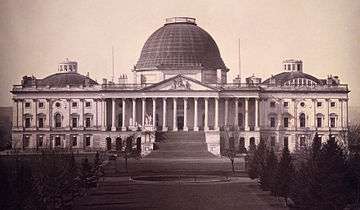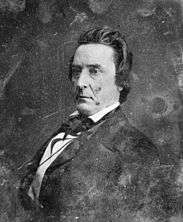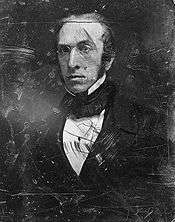30th United States Congress
| 30th United States Congress | |||||||||||||||||||||||||||||
| |||||||||||||||||||||||||||||
The Thirtieth United States Congress was a meeting of the legislative branch of the United States federal government, consisting of the United States Senate and the United States House of Representatives. It met in Washington, D.C. from March 4, 1847 to March 4, 1849, during the last two years of the administration of President James K. Polk. The apportionment of seats in the House of Representatives was based on the Sixth Census of the United States in 1840. The Senate had a Democratic majority, and the House had a Whig majority. It was the only Congress in which Abraham Lincoln served.
Major events

- July 1, 1847: United States issued its first postage stamps
- January 24, 1848: Gold found at Sutter's Mill, beginning the California Gold Rush
- January 31, 1848: Washington Monument established
- July 19, 1848: Seneca Falls Convention
- November 7, 1848: U.S. presidential election, 1848: Whig Zachary Taylor defeated Lewis Cass in the first US presidential election held in every state on the same day.
- 1846–1848: Mexican-American War
Major legislation
- March 3, 1849: United States Department of the Interior established, sess. 2, ch. 108, 9 Stat. 395
- March 3, 1849: Gold Coinage Act, sess. 2, ch. 109, 9 Stat. 397
Treaty
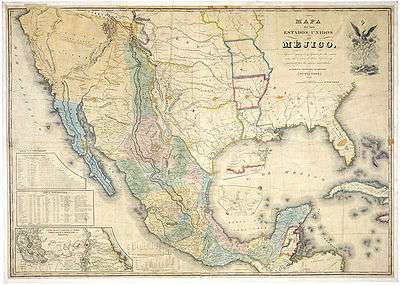
- February 2, 1848: Treaty of Guadalupe Hidalgo signed, ending the Mexican–American War and ceding to the United States virtually all of what is today the southwest United States.
States admitted and territories established
- May 29, 1848: Wisconsin admitted as the 30th U.S. state, sess. 1, ch. 50, 9 Stat. 235
- August 14, 1848: Oregon Territory was formed from territory ceded by Great Britain and others.
- March 3, 1849: Minnesota Territory formed from the Wisconsin Territory, sess. 2, ch. 121, 9 Stat. 403
Party summary
Senate
During this congress, two Senate seats was added for the new state of Wisconsin.
| Party (shading shows control) |
Total | Vacant | ||||
|---|---|---|---|---|---|---|
| Democratic (D) |
Independent Democratic (ID) | Whig (W) | Other | |||
| End of the previous congress | 31 | 0 | 24 | (Liberty) 1 |
56 | 2 |
| Begin | 33 | 1 | 20 | 0 | 54 | 2 |
| End | 38 | 21 | 60 | 0 | ||
| Final voting share | 63.3% | 1.7% | 35.0% | 0.0% | ||
| Beginning of the next congress | 33 | 0 | 25 | 0 | 58 | 2 |
House of Representatives
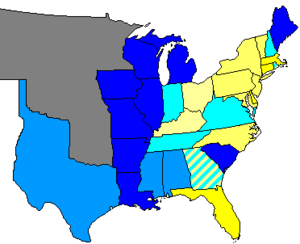
| House seats by party holding plurality in state | |
|---|---|
80+ – 100% Democratic |
80+ – 100% Whig |
60+ – 80% Democratic |
60+ – 80% Whig |
Up to 60% Democratic |
Up to 60% Whig |
During this congress, two House seats were added for the new state of Wisconsin.
| Affiliation | Party (Shading indicates plurality caucus) |
Total | |||||
|---|---|---|---|---|---|---|---|
| American (Know-nothing) (A) |
Democratic (D) |
Independent Democratic (ID) |
Whig (W) |
Independent (I) |
Vacant | ||
| End of previous Congress | 12 | 137 | 0 | 77 | 0 | 226 | 2 |
| Begin | 1 | 107 | 2 | 116 | 1 | 227 | 1 |
| End | 110 | 3 | 115 | 230 | 0 | ||
| Final voting share | 0.4% | 47.8% | 1.3% | 50.0% | 0.4% | ||
| Beginning of next Congress | 1 | 113 | 0 | 107 | 0 | 230 | 1 |
Leadership

George M. Dallas
Senate
House of Representatives
Members
This list is arranged by chamber, then by state. Senators are listed in order of seniority, and Representatives are listed by district.
Senate
House of Representatives
The names of members of the House of Representatives are preceded by their district numbers.
Changes in membership
The count below reflects changes from the beginning of the first session of this Congress.
Senate
- Replacements: 11
- Democrats (D): 4 seat net gain
- Whigs (W): no net change
- Deaths: 5
- Resignations: 6
- Interim appointments: 7
- Seats of newly admitted states: 4
| State (class) |
Vacator | Reason for change | Successor | Date of successor's formal installation |
|---|---|---|---|---|
| Tennessee (2) |
Vacant | Failure to elect. Successor elected November 22, 1847. |
John Bell (W) | Elected November 22, 1847. |
| Iowa (2) |
Vacant | Iowa had been admitted to the Union December 28, 1846, but the legislature failed to elect due to a three-way split that prevented any candidate from earning the required number of 30 legislators' votes.[1] First Senator elected December 7, 1848. |
George W. Jones (D) | Elected December 7, 1848. |
| Iowa (3) |
Vacant | Iowa had been admitted to the Union December 28, 1846, but the legislature failed to elect due to a three-way split that prevented any candidate from earning the required number of 30 legislators' votes.[1] First Senator elected December 7, 1848. |
Augustus C. Dodge (D) | Elected December 7, 1848. |
| Texas (2) |
Vacant | Legislature failed to elect due to a dispute over who was entitled to fill a vacancy.[2] Elected December 19, 1847. |
Samuel Houston (D) | Seated January 24, 1848. |
| Mississippi (1) |
Jesse Speight (D) | Incumbent died May 1, 1847. Successor appointed August 10, 1847 and then elected January 1848. |
Jefferson Davis (D) | Appointed December 5, 1847. |
| Connecticut (1) |
Jabez W. Huntington (W) | Incumbent died November 1, 1847. Successor appointed November 11, 1847 and then elected May 1848. |
Roger S. Baldwin (W) | Appointed December 5, 1847. |
| Maine (1) |
John Fairfield (D) | Incumbent died December 24, 1847. Successor appointed January 5, 1848. |
Wyman B. S. Moor (D) | Appointed January 5, 1848. |
| Georgia (3) |
Walter T. Colquitt (D) | Incumbent resigned February 4, 1848. Successor appointed February 4, 1848 to finish the term. |
Herschel V. Johnson (D) | Appointed February 4, 1848. |
| Arkansas (3) |
Ambrose H. Sevier (D) | Incumbent resigned March 15, 1848. Successor appointed March 30, 1848 to finish the term. |
Solon Borland (D) | Appointed March 30, 1848. |
| Arkansas (2) |
Chester Ashley (D) | Incumbent died April 29, 1848. Successor appointed May 12, 1848 and elected sometime thereafter. |
William K. Sebastian (D) | Elected May 12, 1848. |
| Wisconsin (1) |
Wisconsin admitted to the Union May 29, 1848. First Senator elected June 8, 1848. |
Henry Dodge (D) | Elected June 8, 1848. | |
| Wisconsin (3) |
Wisconsin admitted to the Union May 29, 1848. First Senator elected June 8, 1848. |
Isaac P. Walker (D) | Elected June 8, 1848. | |
| Michigan (1) |
Lewis Cass (D) | Incumbent resigned May 29, 1848 to run for U.S. President. Successor appointed June 8, 1848. |
Thomas Fitzgerald (D) | Elected June 8, 1848. |
| Maine (1) |
Wyman B. S. Moor (D) | Interim appointee retired when successor elected June 7, 1848. | Hannibal Hamlin (D) | Elected June 7, 1848. |
| Kentucky (3) |
John J. Crittenden (W) | Incumbent resigned June 12, 1848 to run for Governor of Kentucky. Successor appointed June 23, 1848 and elected sometime thereafter. |
Thomas Metcalfe (W) | Elected June 23, 1848. |
| Alabama (3) |
Arthur P. Bagby (D) | Incumbent resigned June 16, 1848 to become U.S. Minister to Russia. Successor elected July 1, 1848. |
William R. King (D) | Elected July 1, 1848. |
| Alabama (2) |
Dixon H. Lewis (D) | Incumbent died October 25, 1848. Successor elected November 25, 1848. |
Benjamin Fitzpatrick (D) | Elected November 25, 1848. |
| Delaware (1) |
John M. Clayton (W) | Incumbent resigned February 23, 1849 to become U.S. Secretary of State. Successor elected February 23, 1849. |
John Wales (W) | Elected February 23, 1849. |
House of Representatives
- Replacements: 10
- Democrats (D): no net change
- Whigs (W): no net change
- Deaths: 7
- Resignations: 0
- Contested election: 1
- Seats of newly admitted states: 2
- Total seats with changes: 12
| District | Vacator | Reason for change | Successor | Date successor seated |
|---|---|---|---|---|
| Illinois 5th | Vacant | Representative Stephen A. Douglas resigned at end of previous congress. | William A. Richardson (D) | Seated December 6, 1847 |
| Virginia 2nd | George Dromgoole (D) | Incumbent died April 27, 1847. | Richard K. Meade (D) | Seated August 5, 1847 |
| Michigan 2nd | Edward Bradley (D) | Incumbent died August 5, 1847. | Charles E. Stuart (D) | Seated December 6, 1847 |
| Pennsylvania 6th | John W. Hornbeck (W) | Incumbent died January 16, 1848. | Samuel A. Bridges (D) | Seated March 6, 1848 |
| Massachusetts 8th | John Quincy Adams (W) | Incumbent died February 23, 1848. | Horace Mann (W) | Seated April 3, 1848 |
| New York 27th | John M. Holley (W) | Incumbent died March 8, 1848. | Esbon Blackmar (W) | Seated December 4, 1848 |
| South Carolina 1st | James A. Black (D) | Incumbent died April 3, 1848. | Daniel Wallace (D) | Seated June 12, 1848 |
| New York 6th | David S. Jackson (D) | James Monroe contested seat after which the House declared the seat vacant April 19, 1848. | Horace Greeley (W) | Seated December 4, 1848 |
| Wisconsin 1st | Wisconsin admitted into the Union May 29, 1848 and seat remained vacant until June 8, 1848. | William P. Lynde (D) | Seated June 8, 1848 | |
| Wisconsin 2nd | Wisconsin admitted into the Union May 29, 1848 and seat remained vacant until June 8, 1848. | Mason C. Darling (D) | Seated June 8, 1848 | |
| Wisconsin Territory At-large | John H. Tweedy (W) | Incumbent was disqualified May 29, 1848 after the portion of territory he resided in achieved statehood. | Henry H. Sibley | Seated October 30, 1848 |
| South Carolina 4th | Alexander D. Sims (D) | Incumbent died November 22, 1848. | John McQueen (D) | Seated February 12, 1849 |
Committees
Lists of committees and their party leaders.
Senate
- Agriculture
- Audit and Control the Contingent Expenses of the Senate
- Claims
- Commerce
- Distributing Public Revenue Among the States (Select)
- District of Columbia
- Expedition of John C. Fremont (Select)
- Finance
- Foreign Relations
- Indian Affairs
- Judiciary
- Manufactures
- Memorial of Certain Cherokee Claimants (Select)
- Military Affairs
- Militia
- Monuments to Deceased Senators (Select)
- Naval Affairs
- Oregon Railroad (Select)
- Ordnance and War Ships (Select)
- Patents and the Patent Office
- Pensions
- Post Office and Post Roads
- Printing
- Private Land Claims
- Public Buildings and Grounds
- Public Lands
- Retired List for the Army and the Navy (Select)
- Retrenchment
- Seventh Census (Select)
- Revolutionary Claims
- Rivers and Harbors Convention in Chicago (Select)
- Roads and Canals
- Tariff Bill of 1828 (Special)
- Tariff Regulation (Select)
- Territories
- Whole
House of Representatives
- Accounts
- Agriculture
- Claims
- Commerce
- District of Columbia
- Elections
- Engraving
- Expenditures in the Navy Department
- Expenditures in the Post Office Department
- Expenditures in the State Department
- Expenditures in the Treasury Department
- Expenditures in the War Department
- Expenditures on Public Buildings
- Foreign Affairs
- Indian Affairs
- Invalid Pensions
- Manufactures
- Mileage
- Military Affairs
- Militia
- Naval Affairs
- Patents
- Post Office and Post Roads
- Public Buildings and Grounds
- Public Expenditures
- Public Lands
- Revisal and Unfinished Business
- Revolutionary Claims
- Roads and Canals
- Rules (Select)
- Standards of Official Conduct
- Territories
- Ways and Means
- Whole
Joint committees
Employees
Senate
- Chaplain: Henry Slicer (Methodist)
- Secretary: Asbury Dickens
- Sergeant at Arms: Robert Beale
House of Representatives
- Chaplain Ralph Gurley (Presbyterian)
- Clerk: Thomas J. Campbell
- Doorkeeper: Robert E. Horner
- Postmaster: John M. Johnson
- Sergeant at Arms: Nathan Sergeant
See also
- United States elections, 1846 (elections leading to this Congress)
- United States elections, 1848 (elections during this Congress, leading to the next Congress)
References
- 1 2 Clark, Dan Elbert (1913). "History of Senatorial Elections in Iowa". Iowa. pp. 17–46, 72–79.
- ↑ Friend, Llerena (1954). Sam Houston, the Great Designer. University of Texas Press. p. 187. ISBN 0292789114.
- Martis, Kenneth C. (1989). The Historical Atlas of Political Parties in the United States Congress. New York: Macmillan Publishing Company.
- Martis, Kenneth C. (1982). The Historical Atlas of United States Congressional Districts. New York: Macmillan Publishing Company.
External links
- Statutes at Large, 1789–1875
- Senate Journal, First Forty-three Sessions of Congress
- House Journal, First Forty-three Sessions of Congress
- Biographical Directory of the U.S. Congress
- U.S. House of Representatives: House History
- U.S. Senate: Statistics and Lists
- Congressional Directory for the 30th Congress, 1st Session.
- Congressional Directory for the 30th Congress, 3rd Session.
